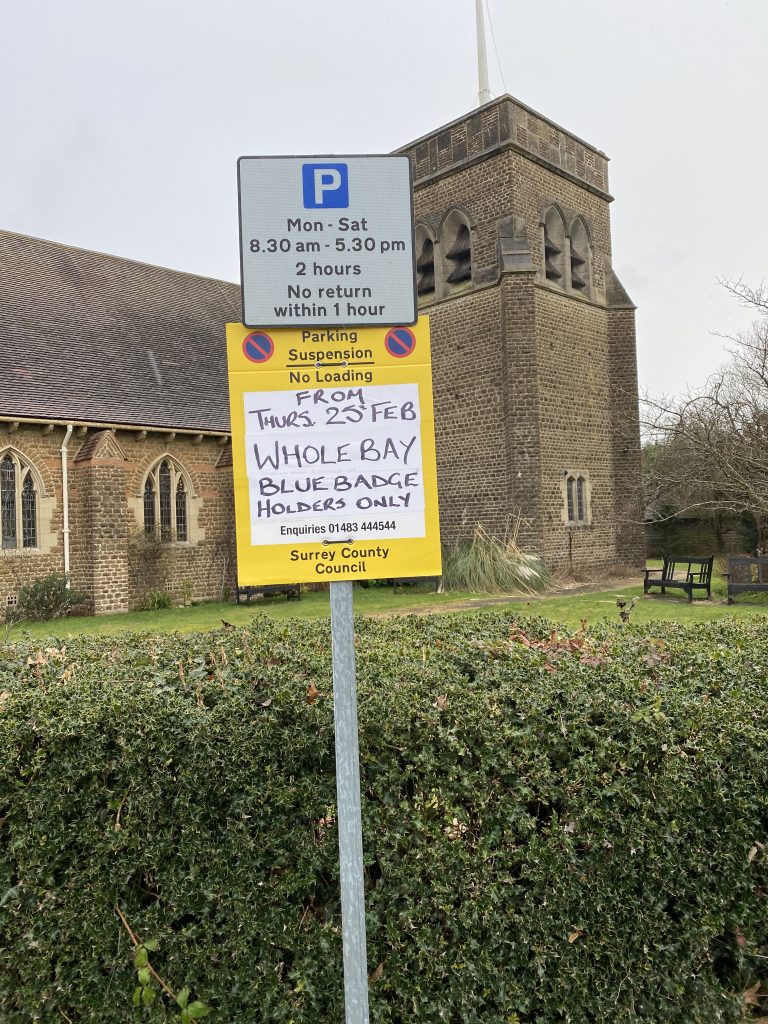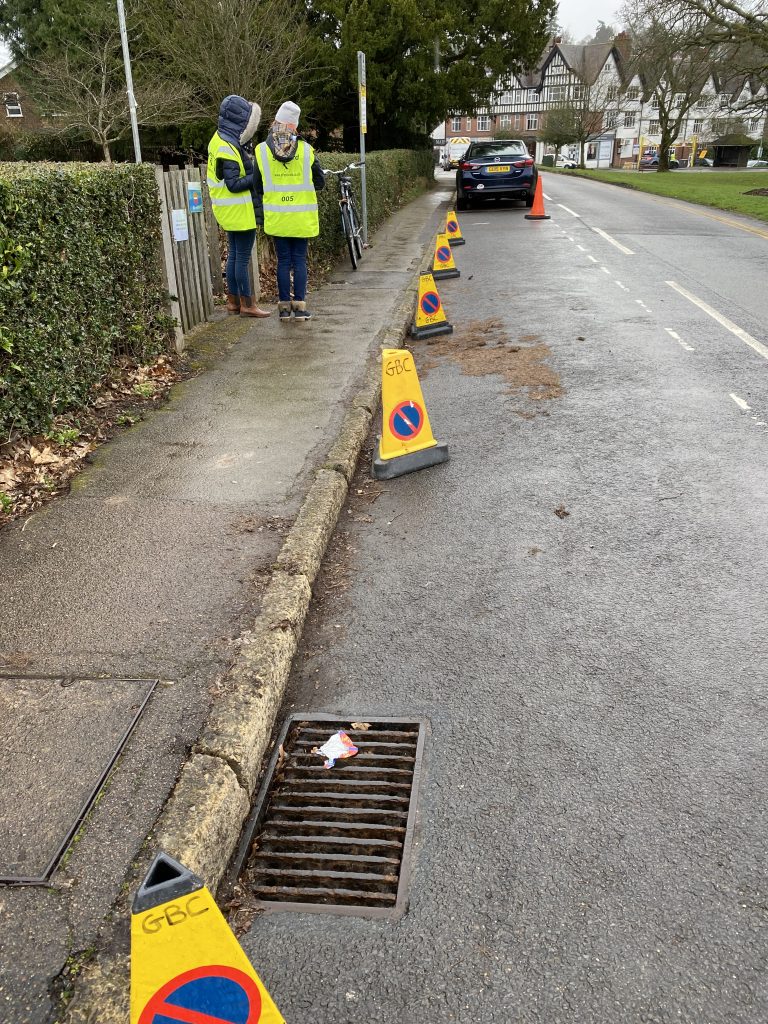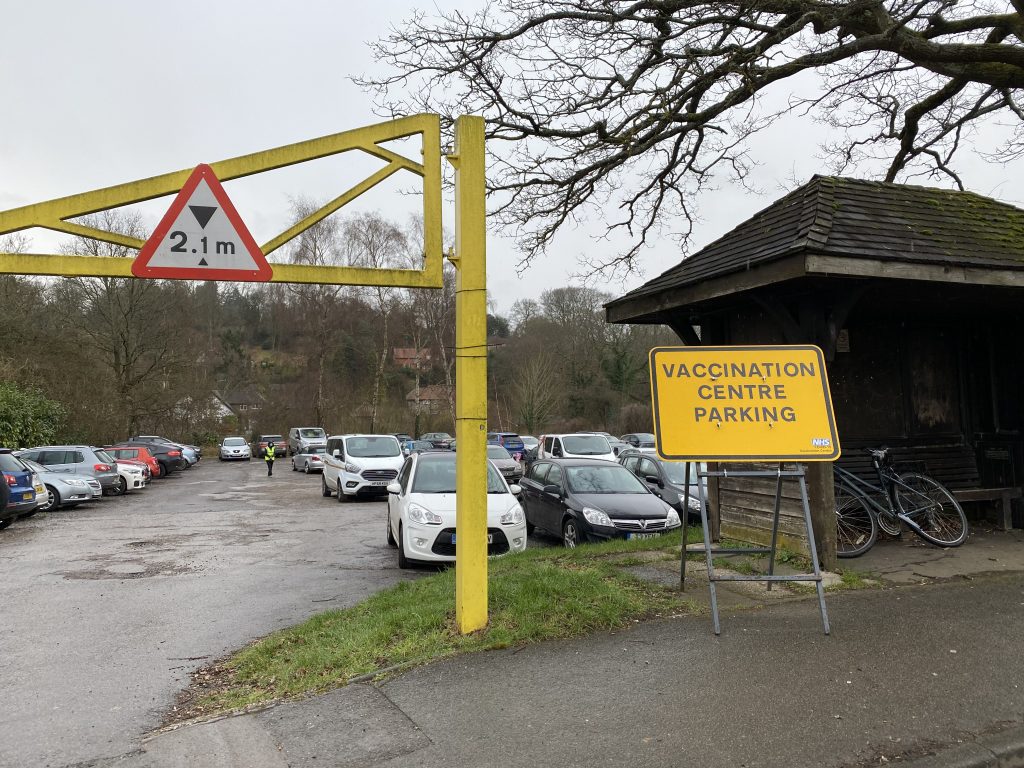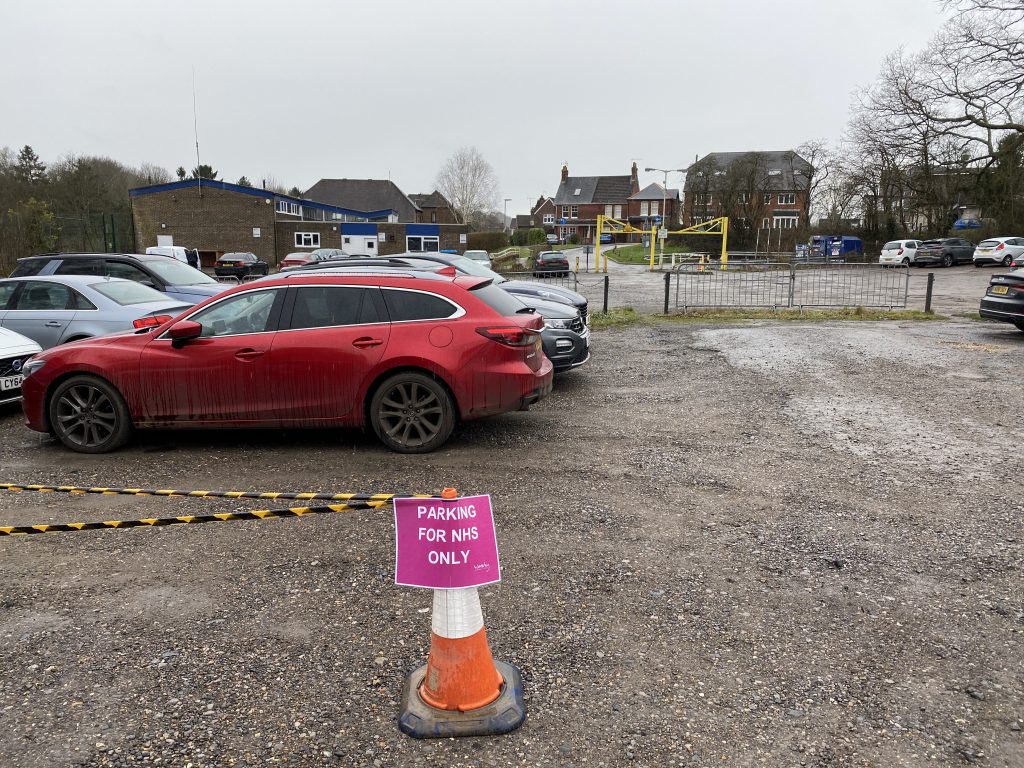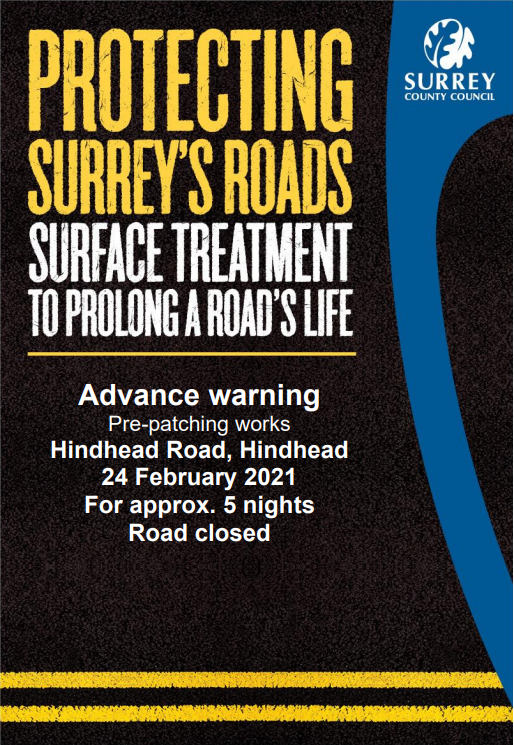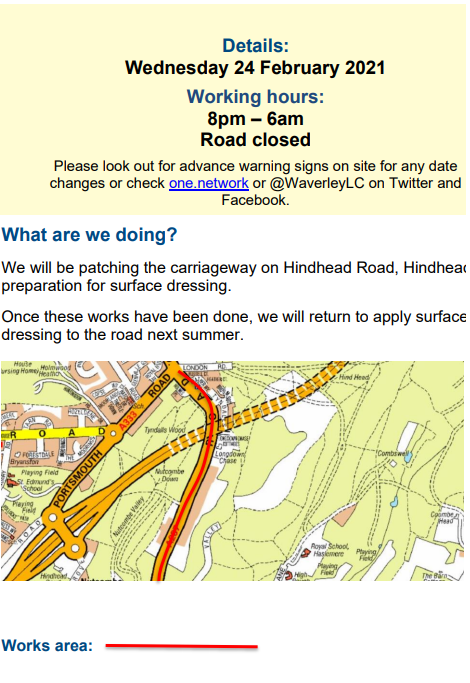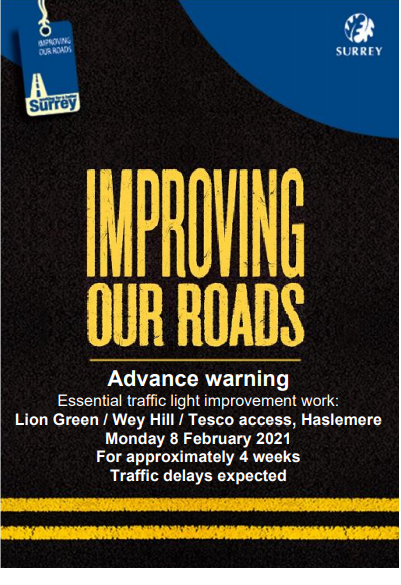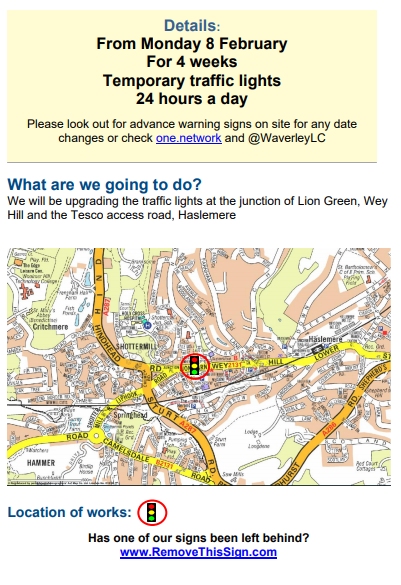Continued
rain over the next two days, this combined with lowered temperatures may cause
ice and a skid risk. Looking further ahead there is a chance of
snow and dropping temperatures causing further problems on Surreys road.
Surrey Highways are working hard to keep the roads clear, safe and Surrey
moving.
Snow
The Met Office
has issued a yellow weather warning for Surrey across the weekend – UK
weather warnings – Met Office
The current
forecast is that we will get snow across the county from later Saturday night
early Sunday morning. Significant accumulations of snow are possible,
particularly in the east of the county and on higher ground. The daily
winter updates will continue to be sent out with more specific information when
treatments are planned.
We have a team
of snow ploughs, 4x4s and our snow angels on standby to assist as necessary –
they help with clearing pavements and local roads/routes.
We have
enhanced gritting and provisions for the testing and vaccinations sites across
the county, our routes can be found online along with which roads get gritted –
Salting
routes in Surrey – Surrey County Council (surreycc.gov.uk)
Winter advice
can be found online with lots of links to help you prepare for the ice and snow
– Winter
advice 2020-21 – Surrey County Council (surreycc.gov.uk)
There is a
salting and gritting fact page that we have updated and it has much of the
information attached to this email – Salting
and gritting facts – Surrey County Council (surreycc.gov.uk)
We will
continue to update as necessary throughout the weekend, and our dedicated road
and transport updates page will be updated as necessary – Roads
and transport updates – Surrey County Council (surreycc.gov.uk)
Rain/Flooding
The river
levels remain very high following the recent rainfall and you may have seen
that the Environment Agency have deployed a temporary flood barrier at Walton
Lane in Weybridge.
A number of
other areas in the county have also seen flooding of roads due to the rainfall
and high groundwater levels preventing water draining away.
The river
levels have stabilised and should start to drop over the coming days, however
as the catchment remains wet any further rainfall is likely to have an impact.
If there is
a threat to life – call 999
· If there is road flooding –
call Surrey CC (Highways) – 0300 200 1003
· If sewers and foul water are
involved – call Thames Water – 0800 316 9800
· If a main river watercourse
is involved – call the Environment Agency – 0345 988 1188
If your enquiry is not urgent,
please contact our team via flooding.enquiries@surreycc.gov.uk.
****************************************************************
10 things you never needed to know about gritting…………..
1. Road Surface Temperatures Are Important. When we watch the weather forecast we are advised of anticipated air temperatures. However, road surface temperatures and air temperatures are rarely the same and the road surface temperature is also used to make decisions on when to apply salt. In order to make sure rock salt is used as efficiently as possible, we use high-tech road sensors that are able to determine road surface temperature. They combine the data with local forecasts before deciding whether gritting is appropriate or not. We currently have 11 road sensors at our weather stations across Surrey, and a further 30 sensors in other locations in the process of being installed this year.
2. Myth – Once the gritter has put salt on the road all ice will melt. This is not true! Spreading salt on the road is only the start of the de-icing process. Movement of salt around the road by traffic is essential to complete the process. Overnight, when traffic levels are low, roads can take longer to melt ice if it has formed.
3. Myth – Spreading salt on fresh snow will melt it more quickly. This is not true! Salt only effectively melts snow when it is less than 40mm deep and traffic can move the salt around.
4. Myth – No matter what the temperature salt will melt the ice. This is not true! Salt is less effective at temperatures below minus five degrees centigrade and takes longer to melt snow and ice in these conditions.
5. How it works; by spreading salt, passing lorry, bus, van and car tyres crush the salt crystals and create a saline solution. This melts any ice present which then washes away into nearby storm drains, leaving roads clear.
6. Gritting is not just about cost – Cost is not the only factor that prevents use using gritting lorries on certain roads. A bigger problem is that some roads and locations are inaccessible in certain locations. This is why we have 1815 grit bins in strategic locations and a small army of farmers who help us with the ploughing and gritting.
7. Gritting is a skilled operation – Gritting requires good driving skills and the ability to operate machinery in challenging conditions, usually in the middle of the night when it’s freezing outside and there is only limited visibility at best. Drivers are City & Guild qualified and have CPC and HGV qualifications
8. The rate and speed of the salt spread is electronically controlled by the lorries. The routes are all GPS tracked with vehicle, speed, location, spread and time on all our routes.
9. We have 11 weather stations across Surrey that give us hourly updates; which show the anticipated air temperature, road surface temperature, wind speed and rain or snowfall. We also have an agreement with neighbouring authorities and Highways England to sue their data. We plan gritting treatments from this information. We also receive a two to five-day forecast every day to help us plan ahead. Each station has a sensor embedded in the road that monitors if the road is ‘chemically wet’ – whether it still has salt dissolved in it from the last treatment or not.
10. The P1 Routes are 39% of the entire counties road network. All treatments are completed within 3 hours.
How are members of staff are involved in gritting? No-one works on gritting full-time. All gritting staff fit their work in around their other full time jobs at the council during the winter season (mid-October to mid-April).
Why are gritters sometimes not spreading salt? This can be deceptive. Gritting vehicles have become more sophisticated, and lorries now dispense the required amount of salt directly down on to the road in a fine spray that you may not see. However, sometimes a vehicle might not be spreading any salt. This might be because:
- • it hasn’t reached the starting point of its treatment route • it is returning to the depot to refill
- • It is driving on a road that is not on the gritting route.
- • it is driving over a section of road that has already been treated by a fellow driver
- • Treatments are occasionally treated prewet (salt and brine mixed) and treatments aren’t clearly visible
Every gritting vehicle is fitted with a GPS system which tracks its route and speed, and it’s part of the inspector’s job to make sure the lorries don’t deviate from their routes. The system also records at what time and location the vehicle is treating and this is monitored after each run to ensure routes are being treated correctly.
The science of gritting
Although we call it gritting, there is in fact little or no grit involved. What is actually spread on the roads is mined rock salt (sodium chloride). The bottom line is this: salt lowers the freezing point of water, and this is how it helps keep roads clear and safer for driving so that things keep moving despite the freeze. As the salt particles come into contact with the snow or ice, melting begins, and water is produced. This water containing dissolved salt is called “brine.” Brine freezes at lower temperatures than regular water, so it remains a liquid at below-freezing temperatures. The brine works its way further into the snow and ice and eventually down to the road surface. From here, brine can spread out under the ice, breaking the bond between the road surface and the ice. The remaining snow and ice float on top of the liquid brine, allowing traffic to quickly break down into slush. Water freezes at 0°C – the presence of the salt prevents water from freezing until -6°C to -8°C. However, salt starts to become less effective at -5°C and almost ineffective at lower temperatures. In extremely low temperatures, or heavy snowfall, a mix of salt and grit may be used to help vehicles get about. Rock salt needs vehicles to drive over it to work effectively. Vehicles grind the salt into smaller particles to spread it across the road – this means that grit is sometimes not effective when there isn’t much traffic or when there is a lot of snow.

